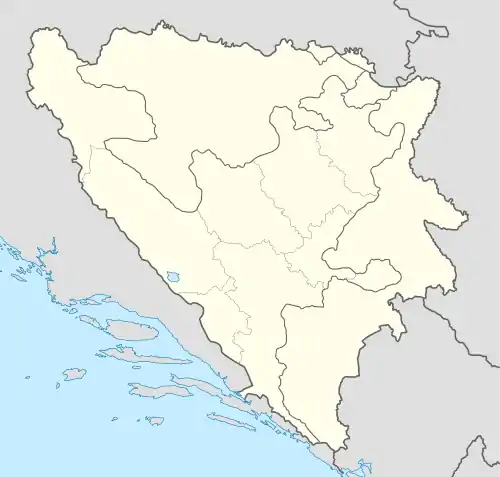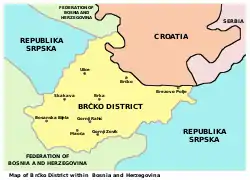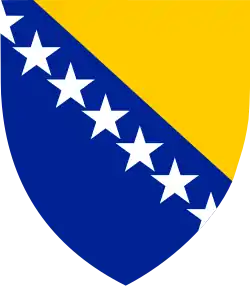Brčko
Brčko (Serbian Cyrillic: Брчко, pronounced [br̩̂tʃkoː]) is a city and the administrative seat of Brčko District, in northern Bosnia and Herzegovina. It lies on the banks of Sava river across from Croatia. As of 2013, it has a population 39,893 inhabitants.[1]
Brčko
Брчко | |
|---|---|
.jpg.webp) Brčko | |
 Brčko Location within Bosnia and Herzegovina | |
| Coordinates: 44.87709°N 18.81096°E | |
| Country | |
| District | Brčko District |
| Government | |
| • Mayor | Esed Kadrić (SDA) |
| • President of the District Assembly | Siniša Milić (SNSD) |
| • International Supervisor (Suspended) | Michael Scanlan |
| Area | |
| • Total | 402 km2 (155 sq mi) |
| • Land | 493 km2 (190 sq mi) |
| Elevation | 92 m (302 ft) |
| Population (2013) | |
| • Total | 39,893 |
| • Density | 99/km2 (260/sq mi) |
| • Brčko District | 83,516 |
| Postcode | 76100 |
| Area code(s) | +387 049 |
| Website | Official website |
Brčko is the only entirely self-governing free city currently in existence in Europe.[2]
Name
Its name is very likely linked to the Breuci (Greek Βρεῦκοι), a subtribe of Pannonian tribes of the Illyrians who migrated to the vicinity of today's Brčko from the territories of the Yamnaya culture in the 3rd millennium BC. Breuci greatly resisted the Romans but were conquered in 1st century BC and a lot of them were sold as slaves after their defeat. They started receiving Roman citizenship during Trajan's rule.
A number of Breuci migrated and settled in Dacia, where a town called Bereck or Brețcu, a river (Brețcu River) and a mountain Munții Brețcului in today's Romania were named after them.[3]
Geography

The city is on the north, riparian border of Bosnia, across the Sava River from the village of Gunja in Croatia.
Brčko is the seat of the Brčko District, an independent unit of local self-government created on the territory of Bosnia and Herzegovina following an arbitration process. The local administration was formerly supervised by an international supervisory regime headed by Principal Deputy High Representative who is also ex officio the Brčko International Supervisor. This international supervision was frozen since 23 May 2012.[4]
History
Brčko was a geographic point of contention in 1996 when the U.S.-led Implementation Force (IFOR) built Camp McGovern on the outskirts of the city. Camp McGovern under the overwatch of 3-5 CAV 1/BDE/1AR Division (US) commanded by LTC Anthony Cucculo was constructed from a war torn farming cooperative structure in the Zone of Separation (ZOS) for the purpose of establishing peacekeeping operations. The mission was to separate the forming warring factions. The ZOS was one kilometer wide of no man's land, where special permission was required for Serbian or Bosnian forces to enter. Various checkpoints and observation points (OP's) were established to control the separation.
Although Brčko was a focal point for tension in the late 1990s, considerable progress in multi-ethnic integration in Brčko has since occurred including integration of secondary schooling. Reconstruction efforts and the Property Law Implementation Plan have improved the situation regarding property and return. Today, Brčko has returned to a strategic transshipment point along the Sava River. The population of Brčko has not returned to its pre-war ethnic mix of Bosniaks, Serbs, and Croats. Brčko sits at the east–west apex of Republika Srpska, the ethnic Serb portion of Bosnia & Herzegovina, and as such is critical to the RS for its economic future.
Brčko was one of the main points discussed in the Dayton Peace Accords. After several weeks of intensive negotiation, the issue of Brčko was to be decided by international arbitration. Brčko Arbitration ruled in May 1997 that Brčko would be a special district managed by an ambassadorial representative from the international community. The first Ambassador to Brčko was an American with support staff from the UK, Sweden, Denmark & France.
The first international organization to open office in Brčko at that time was the Organization for Security and Cooperation in Europe (OSCE) headed by Randolph Hampton.
Following PIC meeting on 23 May 2012, it was decided to suspend, not terminate, the mandate of Brčko International Supervisor. Brčko Arbitral Tribunal, together with the suspended Brčko Supervision, will still continue to exist.[4]
Demographics
| Ethnic composition | |||||||
|---|---|---|---|---|---|---|---|
| 2013 | 1991 | 1981 | 1971 | 1961 | |||
| Total | 39,893 (100.0%) | 41,406 (100.0%) | 31,437 (100.0%) | 25,337 (100.0%) | 17,949 (100,0%) | ||
| Serbs | 19,420 (48.68%) | 8,253 (19.93%) | 5,532 (17.60%) | 5,481 (21.63%) | 5,260 (29.31%) | ||
| Bosniaks | 17,489 (43.84%) | 22,994 (55.53%) | 16,725 (53.20%) | 15,651 (61.77%) | 5,431 (30.26%) | ||
| Croats | 1,457 (3.652%) | 2,894 (6.989%) | 2,157 (6.861%) | 2,663 (10.51%) | 2,472 (13.77%) | ||
| Others-Bosanci i Hercegovci≈ | 996 (2.497%) | 2,054 (4.961%) | 468 (1.489%) | 327 (1.291%) | 78 (0.435%) | ||
| Roma | 333 (0.835%) | 5 (0.016%) | 6 (0.024%) | 4 (0.022%) | |||
| Albanians | 77 (0.193%) | 86 (0.274%) | 115 (0.454%) | 65 (0.362%) | |||
| Yugoslavs | 60 (0.150%) | 5,211 (12.59%) | 6,351 (20.20%) | 952 (3.757%) | 4,250 (23.68%) | ||
| Montenegrins | 31 (0.078%) | 65 (0.207%) | 82 (0.324%) | 278 (1.549%) | |||
| Macedonians | 24 (0.060%) | 16 (0.051%) | 19 (0.075%) | 35 (0.195%) | |||
| Slovenes | 4 (0.010%) | 19 (0.060%) | 25 (0.099%) | 55 (0.306%) | |||
| Turks | 2 (0.005%) | ||||||
| Hungarians | 13 (0.041%) | 16 (0.063%) | 21 (0.117%) | ||||
Transport
Rail
A railway station is near the city centre on the line from Vinkovci to Tuzla. However, no passenger trains operate to Brčko anymore. The closest operating railway station is in Gunja, Croatia; just on the other side of the border.
Water
Brčko has the largest river port in Bosnia, on the Sava river.
Sport
Brčko has three football clubs (FK Jedinstvo Brčko, FK Lokomotiva Brčko, FK Izbor Brčko, FK Dizdaruša Brčko and the youngest club FK Ilićka 01). They all play in the Second League of Republika Srpska.
Education
The city is home to an economics school of the University of East Sarajevo and a local theatre festival.
Gallery
 Panorama of Brčko
Panorama of Brčko Brčko at night
Brčko at night Fountain - the symbol of the city
Fountain - the symbol of the city
Twin towns – sister cities
Brčko is twinned with:
 Smederevska Palanka, Serbia[5]
Smederevska Palanka, Serbia[5] St. Louis, United States[6]
St. Louis, United States[6]
Notable people
- Edo Maajka, rapper
- Lepa Brena, singer
- Edvin Kanka Ćudić, human rights activist
- Mladen Petrić, Croatian footballer
- Vesna Pisarović, singer
- Dženana Šehanović, pianist
- Anton Maglica, Croatian footballer
- Jasmin Imamović, politician
- Nataša Vojnović, Serbian fashion model
- Mato Tadić, judge
- Brankica Mihajlović, Serbian volleyball player, World and European champion, silver medalist at the 2016 Summer Olympics
- Ines Janković, Serbian fashion designer
- Nikola Kovač, Professional Counter Strike Global Offensive player
- Kobra, local comedian.[7]
See also
References
- "Census of Population, Households and Dwellings in Bosnia and Herzegovina" (PDF). 2019. Retrieved November 24, 2020.
- Welcome to Brčko, Europe’s only free city and a law unto itself.
- Kiss Lajos: Földrajzi nevek etimológiai szótára Akadémiai Kiadó, Budapest 1978 ISBN 963 05 1490 7 103. oldal Bereck-szócikk
- "Press Conference Following the Meeting of the Steering Board of the Peace implementation Council". Ohr.int. 2012-05-23. Retrieved 2013-11-23.
- "Успјешно организован турнир млађих категорија у фудбалу". radiobrcko.ba (in Bosnian). Radio Brčko. 2014-08-29. Retrieved 2020-12-28.
- "Sister Cities". stlpartnership.com. St. Louis Economic Development Partnership. Retrieved 2020-12-28.
- "Eduardo Kobra - Wikipedia". en.m.wikipedia.org. Retrieved 2021-01-29.
| Wikimedia Commons has media related to Brčko. |
